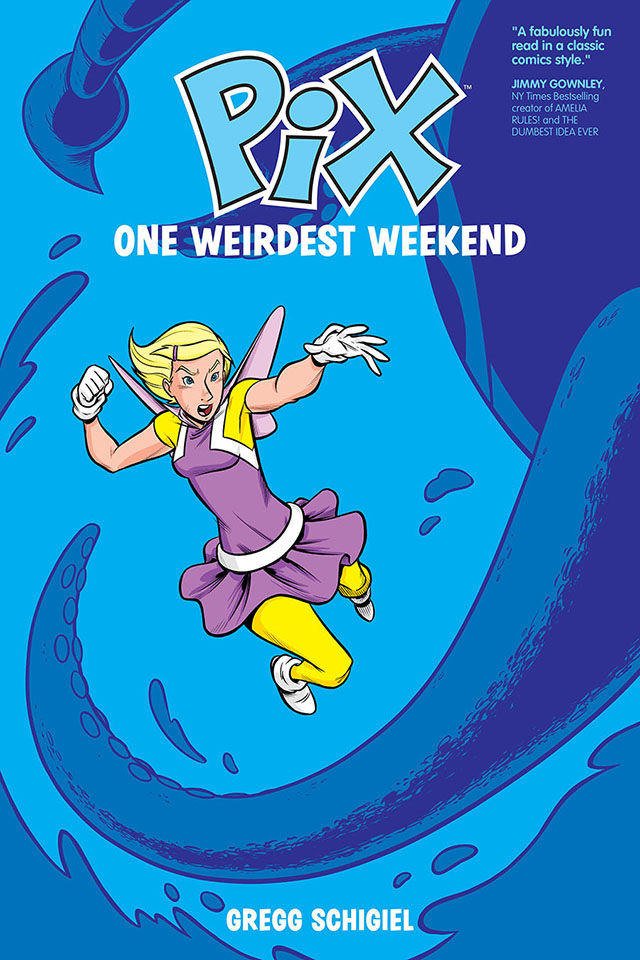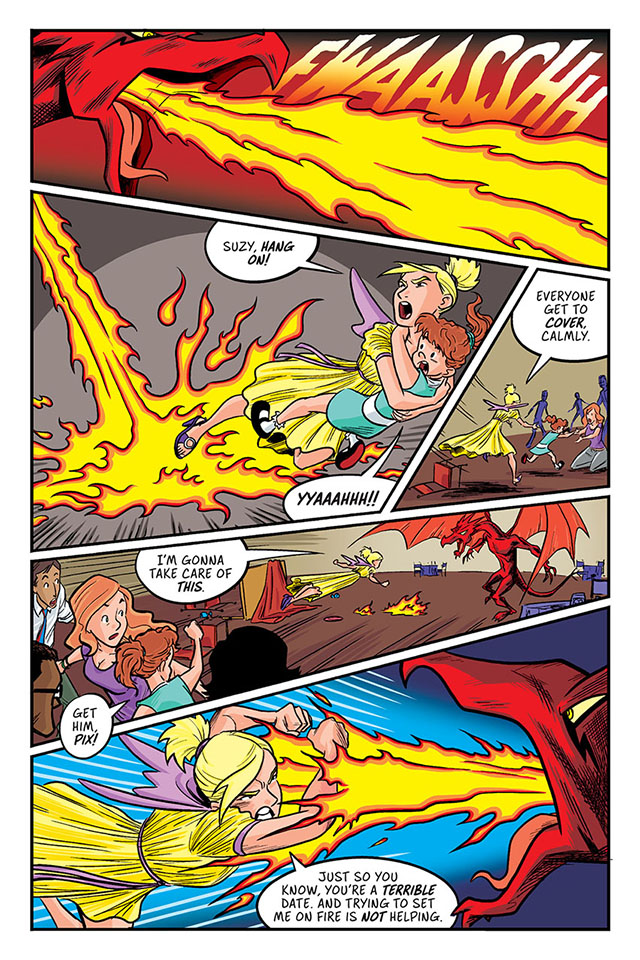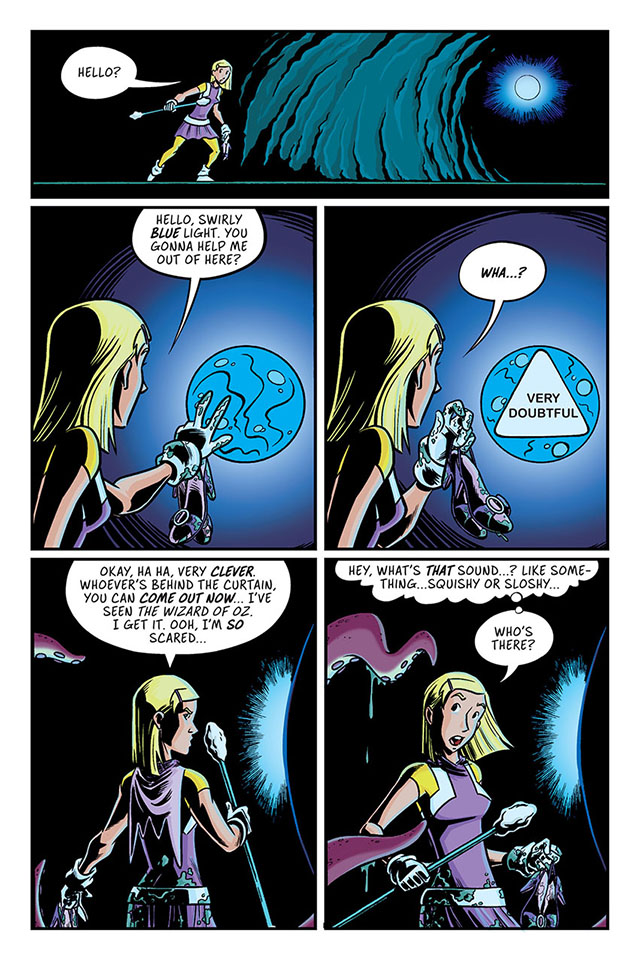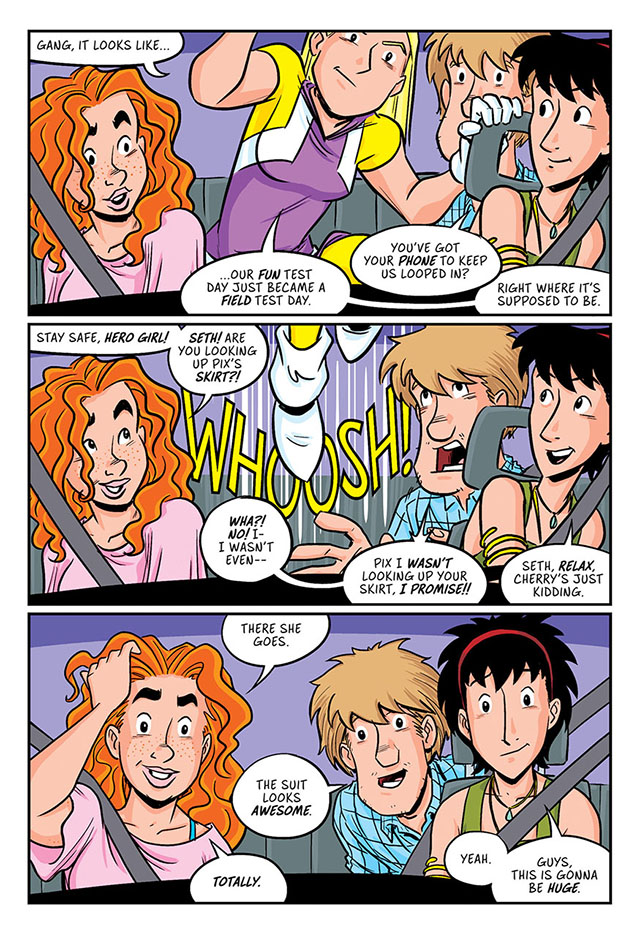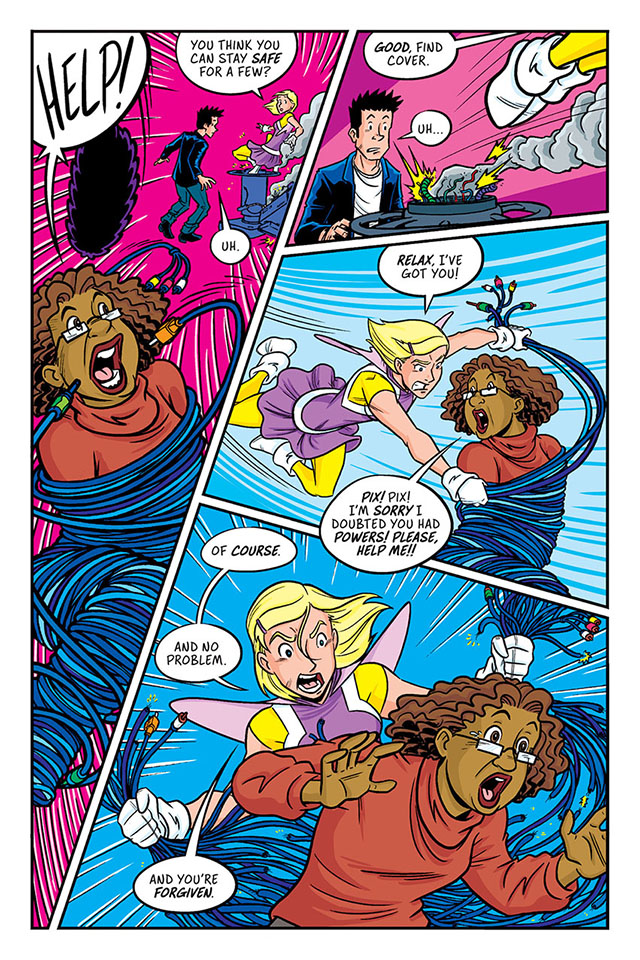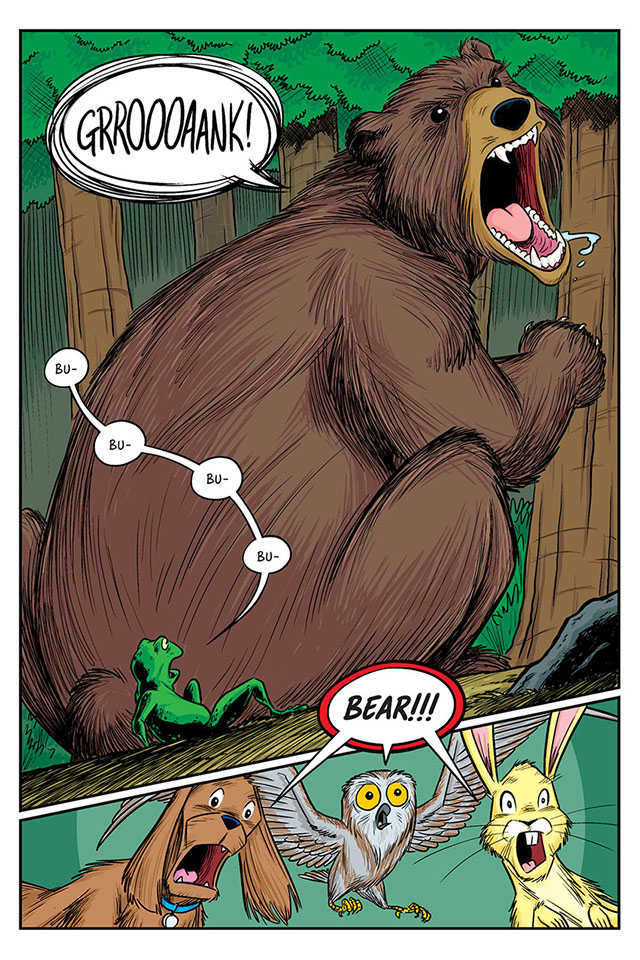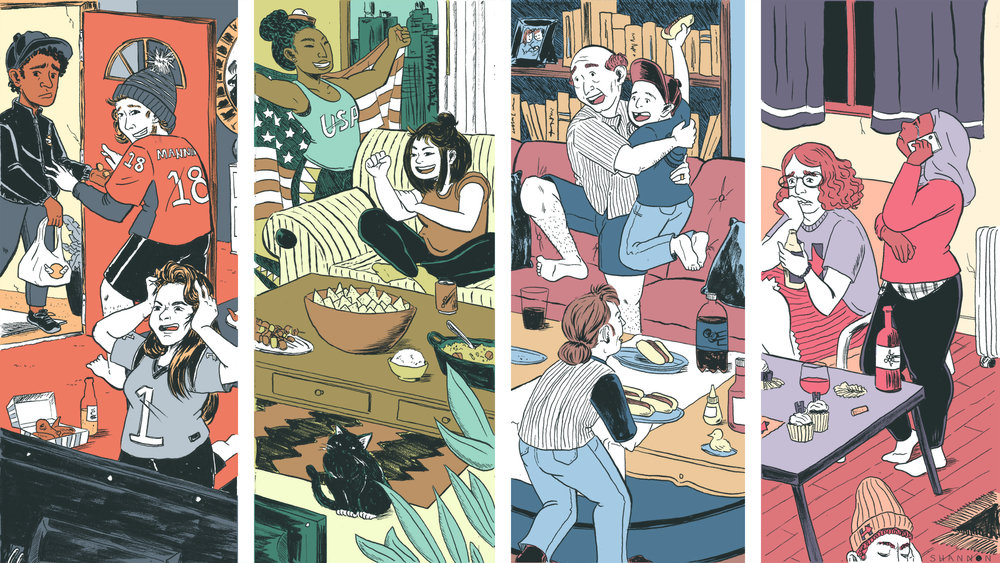Lately Image Comics has been striving to expand their audience with all-ages comics. Graphic novels like Oddly Normal have done well, and Image is hoping new series Pix does the same. To get more insight into how Pix happened and what it’s about, I spoke to its creator, Gregg Schigiel. I interviewed him once before when the book was being self-published but found it prescient and exciting to chat with him again now that one of the most successful and revered names in comics is behind him.
Let’s get the obvious question out of the way first. What’s Pix about?
Pix is a suburban superhero adventure comic about Pix, a teen superhero who believes she’s a fairy princess. The fairy princess stuff raises some eyebrows for people and there’s a question as to if she is what she claims to be.
Book one, One Weirdest Weekend, introduces readers to Pix and her friends and family while pitting her against a number of, well, weird things, like AV equipment come to life, monsters and dragons, being both size and shape-changed, and some talking animals, all over the course of one weekend.
How did Pix end up at Image Comics?
Since self-publishing One Weirdest Weekend and while working on the follow-up, Too Super for School, I saw noticeable efforts and moves on Image’s part to put out and support more kid-friendly material (i.e. Howtoons, Penny Dora, Oddly Normal, Camp Midnight). And when I assessed what I’d done by that point on my own, and what was up ahead, I thought it worth approaching Image to see if they’d be interested in being a home for Pix. So I did exactly that, showed them the first book and everything I had on the second, talked about my intentions for the book, etc, and here we are.
Can you discuss your experiences self-publishing. How was it rewarding and maybe how wasn’t it?
The process of making something whole cloth, from start (idea) to finish (printed book), was incredibly rewarding in many ways. Engaging in every single discipline and aspect to making comics (art generation to pre-press to paper selection), can’t really be quantified. I often refer to my years on staff at Marvel as my grad school, in which case self-publishing Pix was getting my doctorate, if that doesn’t sound too pretentious. And then there’s the plain satisfaction of being able to say I did it. Publishing has always been a goal, and now I’ve done it…and I can, if I choose to, do it again (I still have ISBNs I bought – they sell them in tens).
Where it was less rewarding is where it’s less an “individual game,” if you will. A very popular refrain of advice to folks wanting to break in or make comics is to just MAKE comics…that that’s all it takes, make the thing. I’ve said it! But at a certain point, even if you write, pencil, ink, letter, color, design, and publish a comic…unless someone buys and reads it, it’s only part of the journey. Reaching an audience…getting the book seen and noticed and paid any attention…that requires other people to engage and respond and all that. And that’s been the hardest nut to crack. Getting outlets and websites and reviewers to respond to my emails and inquiries and promotional efforts…getting stores to order one or more copies…and reorder it when they’ve sold said copy/copies…that’s the stuff I can’t control the way I can the number of panels on a page or what font I’m going to use or the cover stock, etc. It’s like on Survivor when, in the end, the players’ fate lies in the hands of the jury. Once I’d done everything I could to make a book I was very proud of, the power shifted to the hands of retailers, reviewers, media gatekeepers, etc.
And all of that compounds when you factor in time and money. So…it’s months I spent making the book at the expense of taking paying work…and then money spent out of pocket (because I didn’t crowd-fund, etc.) to print and ship those books…when sales slow down or you bring 15 to a con and take 14 home…that’s a check for the “less rewarding” column, I’d say.
How has Image made things simpler, easier or just plain better than publishing on your own?
I’m gonna find out! As we’re talking, so far, the very fact that an Image press release got probably 1000% more attention than my own press releases ever did…the fact that I’m not totally out of pocket from the start (in that I’m not spending money; I’m still in the hole, as I won’t make a penny until Image recoups their costs and all)…that’s making things better and easier. That they have a promotions and marketing team, a sales team, people like that, that I can talk to and work with to help my efforts to make this a success…that’s a big change from just me, myself and I spinning all the plates alone.
What are your hopes and/or expectations for Pix now that it’s being published by Image?
My hopes are for Pix to be the Walking Dead of Image’s kid-friendly comics output, with all the rewards that would bring. Why not?! But joking aside, my goal has long been to manage a career where I can create new stories and that that and that alone earns me enough of a living where I can do less work-for-hire and continue creating new things, telling new stories, and so on. This isn’t something that just happens, so realistically speaking, I hope that through Image more people see it, buy it, read it, enjoy it, tell people about it, it sells well enough that I actually see some kind of payday to justify the time, effort and expense…and it eventually reaches Walking Dead levels of success.
How do you feel being labeled as the “SpongeBob SquarePants” artist as you’re promoting it?
I’ve been drawing SpongeBob in some form or another since February 2000, and I’d be lying to myself to say it wasn’t the thing I’m most known for/connected to professionally…and also the thing that most registers with the wider audience. So on the one hand it’s a great thing for the resume that could get people to pay attention. To the world at large there’s value and cache to my connection to SpongeBob, who’s now a cultural icon, more so than that I worked on a well-regarded issue of WHAT IF? or do a podcast about Tom Cruise movies.
On the other hand, I find the direct market maybe doesn’t have the same appreciation for SpongeBob seeing it as “another licensed character” (despite SpongeBob Comics being published by SpongeBob creator, Steve Hillenburg, making it ostensibly a creator-owned comic), which…that’s an entirely different conversation. But, SpongeBob Comics is a really great book, and I can only hope (savvy) shop owners know that and might give them faith in Pix by virtue of my association there.
Since I discovered your podcast and found your lesser known work I’ve seen how you’re not just a maker of kids comics. Are you worried about being boxed into that label?
A lot of authors and illustrators I’ve admired played both sides of that coin…Jules Feiffer, Shel Silverstein, Judy Blume…even Dr. Seuss, did work for kids and played in the grown-up waters, too. So no, it’s not something I worry about, especially since I very much enjoy making material for the younger audience, indulging the things I loved as a kid and endeavoring to make stuff that kids might love in the same way.
If I’m seen as a maker of great kids comics, I think I can live with that.
What are your general thoughts on the fairy princess genre as a whole?
I’ve always loved Disney movies, and read fairy tales and mythology as a kid, so that overall KIND of story I like – magical without being hardcore fantasy, which isn’t to say it lacks depth, but more that it’s broader in its appeal, maybe?
Beyond that, I do find the criticisms and discussions about princess stories over the past number of years very valid and compelling, and I’ve become more aware of those things as a result. Along those lines, the book Cinderella Ate My Daughter, by Peggy Orenstein, (from what I read of it) is a really interesting examination of the “princess” phenomenon, which seems like the bigger thing than fairy stuff, right? Like, of the Disney princesses, none of them are fairy princesses. Aurora (Sleeping Beauty) has fairy godmothers…and Tinkerbell’s a fairy, but not a princess.
Fairy stuff, meanwhile…the magical powers, the secrecy of their worlds…kind of exist in that superhero wheelhouse, so that might explain why I like it, too.
How does Pix subvert or play into that genre?
Hmm. Interesting question. It plays into it in that I very much use fairy tale tropes in the story…there’s a dragon in there, there’s a fairy godmother-like character at one point, there’s a frog who might be something more…though how those things play out and resolve aren’t trope-ish.
How it diverts from the standard expectations is probably clearest in how the fairy and princess talk aren’t really believed by other characters. There’s a question as to whether she even IS a fairy princess, and the result of that means a different kind of exploration of that idea. And the superhero stuff surely plays around with things via a new angle. If it’s subversive I don’t know. I guess on some level it is, as it strays from the norm and treats the whole idea in a (hopefully) distinct way.
What’s the plan for Volume 2?
Book two, Two Super for School, begins about a day after the events in One Weirdest Weekend, with Pix returning to school after spring break. Things take a downward turn when events lead to Pix making a bold decision and real effort to “be normal”, which…why would that work out at all? There’s lots of dramatic drama and felt feelings…I tying up some loose threads from book one and opening new cans of worms…and maybe most important of all, I’ll reveal whether or not Pix is or isn’t the fairy and/or princess she believes she is.
It’s all written, penciled, inked and lettered, and I’m in the process of coloring it at the moment.
That’s coming out on May 3rd.
What makes Pix so special to you that you took the time and effort to self-publish it, and how do you feel about it coming to Image now?
The genesis of Pix goes back to the early 2000s. Early on, I was seeing what was then a mostly ignored audience in comics: girls. It’s never been a secret that girls read, but back then there wasn’t the effort in comics, especially superhero comics, that we’ve seen more recently to reach that audience, and I thought a fun, dynamic girl superhero was worth pursuing.
Since then there were starts and stops. I made mini-comics in ’08 and ’09…pitched it around based on those to no avail…and finally, with the industry changes in the ensuing 10 or so years – a wider audience, greater acceptance of comics by libraries and schools, etc. – I put my time (and money) where my mouth was and self-published it.
And now I’m psyched to have Image on my side to see things through and push further than I could on my own. It’s a LOT of work, making one of these books, and before partnering with Image, as I was working on book two, I more than once thought, “Why am I doing this? Will anyone notice? You’re just losing money and time.”… thoughts not exclusive to me, I’m sure. Image taking it on is a real vote of confidence from what’s now the #3 publisher in comics and the premier publisher of independent, original comics. It feels pretty awesome.
Pix comes out TOMORROW, February 22nd. Don’t miss it.


